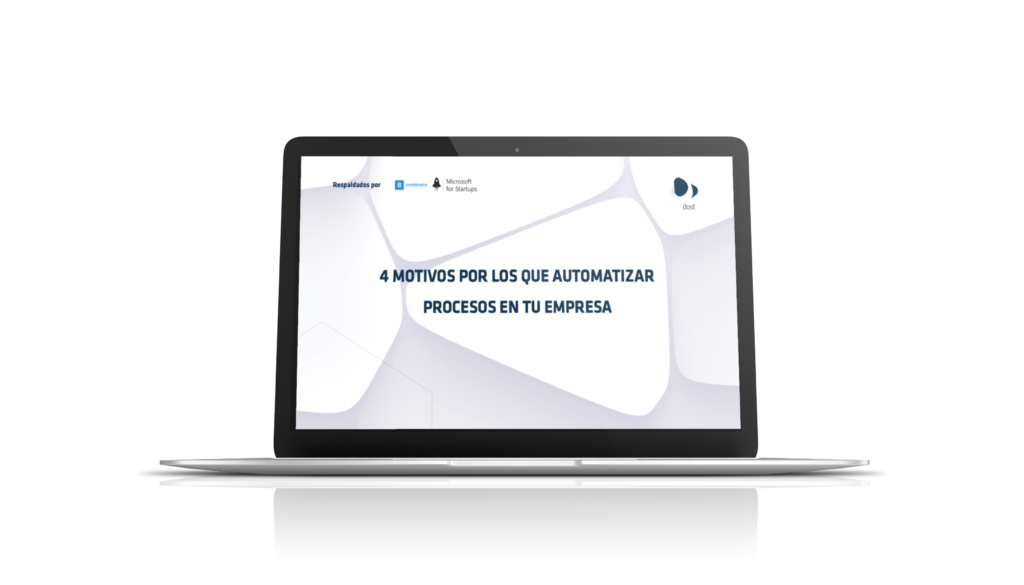Ahorra tiempo y dinero
Ahorra tiempo e inviértelo en actividades innovadoras
Desde hace años, las empresas vienen trabajando en la formalización de sus procesos, sustentados con tecnología, como es el caso de las soluciones BPM (Business Process Management). La tendencia en éstos últimos es empezar a dar autonomía a esos procesos ya formales, también con tecnología, como el BPA (Business Process Automation). Esto supone un paso más en la madurez como empresa, ayudando a las organizaciones a mejorar su eficiencia y productividad, reducir costes y eliminar errores que puedan causar retraso en el desempeño de la tarea.
Un motivo por el que automatizar procesos es la disminución del tiempo de procesamiento de facturas de proveedores. La implementación de Dost reduce hasta un 85% el tiempo en la gestión documental y permite mejorar la eficiencia y productividad del departamento financiero.
Evidentemente, se produce una disminución significativa del tiempo dedicado al control y revisión de las facturas recibidas. Además, se ahorra tiempo en la digitalización, clasificación.
Al eliminar errores humanos, ganamos mucho tiempo en resolver errores lógicos de tareas mecánicas, repetitivas y sin valor. La automatización es clave para evitar errores humanos; incluso los trabajadores más diligentes pueden equivocarse al introducir datos manualmente. Las tareas repetitivas aburren a los empleados y les hacen vulnerable a cometer errores, sobre todo cuando se trata de volúmenes grandes de procesamiento de datos.
La automatización de procesos es uno de los temas más importantes actualmente en cualquier tipo de empresa. La digitalización no sólo ha llegado a las oficinas, también está presente en el día a día de los empleados y emprendedores.
Ahorra dinero y recursos que pueden invertirse en otras actividades
Ahorro de tiempo, aumento de la efectividad, mejora la calidad y permite conseguir resultados mucho más rápidamente. Además, mejora la productividad y competitividad de tu negocio.
La introducción manual de datos supone un alto coste económico en el departamento financiero-contable, con un riesgo añadido ya que los errores en la introducción manual pueden afectar a los reportes contables, presupuestos y otro tipo de informes.
La automatización de procesos reduce y simplifica las tareas operativas, lo que permite un aumento en la productividad y una mejora en tu rentabilidad. Además, gracias a su inteligencia artificial, Dost te ayuda a reducir el tiempo y el coste de procesamiento de facturas de proveedores.
De acuerdo al estudio “Procesamiento automático de facturas: estado del arte y tendencias” del IIR (Instituto de Idiomas y relaciones Internacionales), el 80% de las empresas recibe sus facturas en papel y la mayoría aún las digitaliza para procesarlas. Esta ineficiencia afecta al departamento financiero-contable, especialmente en lo que se refiere al coste para la empresa.
Suponte que quieres incrementar tu productividad pero no sabes cómo hacerlo. Una forma es eliminando las tareas repetitivas y/o manuales que ocupan la mayor parte de tu tiempo. La automatización de procesos te permite lograr este objetivo, ya que elimina la necesidad de realizar actividades repetitivas y tediosas, como la introducción manual de datos o la revisión diaria de los reportes contables.
Automatiza procesos repetitivos y sin valor para la empresa
Actualmente el grado de desarrollo de la automatización inteligente de procesos todavía no ha calado lo suficientemente fuerte dentro de las empresas. Esto es debido a que es una tecnología que ha aparecido en los últimos años, aunque su crecimiento está siendo increíblemente grande.
Cuando nos encontramos con empresas que ya vienen trabajando desde hace años con una tecnología antigua, como es el caso de los OCR, qué se pusieron a disposición de las empresas de forma extensiva a lo largo de las dos pasadas décadas, nos resulta muy sencillo demostrar todo el valor añadido que la Inteligencia Artificial es capaz de añadir al procesamiento de documentos.
La hiperautomatización hay que valorarla desde el punto de vista del ser humano para multiplicar su eficacia. Anteriormente había una curva de aprendizaje, ineficiencias, errores y conocimiento que se perdía. Al final del día, esto no es eficiente para la empresa, siendo más costoso e irregular, generando ninguna ventaja competitiva.
Hoy en día, gracias a la IPA, la automatización de tareas repetitivas apoyadas en un software se está aplicando a las empresas. Por otro lado, la inteligencia artificial realiza distintas funciones dentro de la empresa, y este caso nos permite principalmente analizar y alcanzar muchos más datos que un trabajador, información que después las personas usarán para valorar.
Las principales ventajas de IPA las encontramos en la capacidad de replicarse en distintas empresas, sin necesidad de pasar por un periodo de incertidumbre, proceso que se entiende como similar y con características comunes se podrá aplicar en una primera y una segunda empresa.
A nivel de productividad, funciona todos los días de la semana, todas las horas del día. Además, estos cerebros de automatización cuentan con la mejora globalizada, concepto que significa que contra más veces enfrento a un cerebro a una tarea repetitiva en distintas situaciones, más inteligente se va haciendo, aplicando mejoras captadas de estímulos en distintas empresas.
Esta tecnología, al fin de cuentas, nos permite automatizar una serie de procesos que resultan tediosos para el trabajador. Además, las tareas que cubre este tipo de software en formato SaaS, son tareas manuales y sin valor para la empresa. Aquí buscamos que el empleado trabaje sobre la selección de documentos del cerebro digital, colaborando así estrechamente con la persona.
Esto radica en las empresas de modo positivo, haciendo sentir al trabajador más valiosos de cara a la productividad, dejando de lado la introducción manual de datos a los ERP y generando una sensación de competitividad. Aumenta la productividad y reduce costes de las actividades de backoffice de tu empresa.
El 90% de las empresas aún no han digitalizado sus procesos de gestión documental. Alcanzar la automatización supone un reto añadido, pero cuando lo consigues te ayuda a garantizar que todos los datos son correctos y se almacenan correctamente.
Centraliza en una plataforma el procesamiento de facturas
Aún recordamos durante los primeros años de existencia del SaaS (Software as a Service), cuando muchas empresas todavía confundíamos los conceptos entre el hosting, la infraestructura como servicio y el software como servicio.
Se puede decir ya estamos todos educados en el concepto software como servicio y ha permitido a empresas emergentes, como DOST, ofrecer toda la potencia de su servicio en un modo suscripción con independencia total de la infraestructura y sin necesidad en muchos casos de un proyecto de implantación.
El SaaS sin duda está siendo una de las grandes revoluciones tecnológicas más importantes que hemos vivido. Y no solo se quedará en el punto en el que estamos, sino que se está pronosticando un crecimiento superior al 20% de su uso durante 2022. En parte todo esto es debido a que las empresas han visto en este modelo la mejor forma de flexibilizar sus inversiones aportando herramientas funcionales que no les lastra de cara al futuro.
¿Qué es eso de centralizar en una plataforma el procesamiento de facturas? Cuando hablamos de integraciones, hacemos referencia a la conexión automática entre plataformas sin necesidad de un tercero aprobando el traspaso de datos entre estas. En Dost disponemos de integración con múltiples plataformas de ERP. De este modo, a través de nuestro Dashboard podemos llevar un control completo del procesamiento de facturas de proveedores, sabiendo que esos datos se han distribuido a otras plataformas de manera correcta y con total seguridad.
Un cerebro digital trabaja por ti
La Inteligencia artificial (IA), es la capacidad de una computadora digital o un robot controlado por computadora para realizar tareas comúnmente asociadas con seres inteligentes. Esta es la definición oficial que recibimos del diccionario de la lengua británica. Como bien se puede leer detrás, tiene la connotación de la utilización de una parte cognitiva para tomar decisiones.
¿Cómo hemos llegado a este punto evolutivo en el mundo de los sistemas de información y la computación para que en algunos casos sea capaz de realizar las tareas que una persona lleva a cabo en su día a día, pero de una manera mucho más eficiente sin errores y más rápido?
Para hablar de todo esto tenemos siempre que citar el ejemplo de Alan Turing qué es el precursor de la computación moderna tal y como la conocemos a día de hoy. Sin su máquina para descifrar mensajes codificados, todas las teorías y tecnologías básicas que sustentan la inteligencia artificial no serían posibles. Pero desde finales de la Segunda Guerra mundial hasta nuestros días ha habido muchos cambios evolutivos que han permitido llegar a este estado del arte en el cual muchas veces no somos capaces de discernir si estamos interactuando con un ser humano o una computadora.
Además del incremento exponencial de la capacidad de computación y almacenaje, que ha venido sufriendo la computación, cumpliendo con la ley de Moore, el hecho más relevante en los últimos años ha sido el desarrollo del Cloud tal y como lo conocemos a día de hoy. Sin tener esa capacidad exponencial de computación, almacenaje y pago por uso, las empresas difícilmente hubiesen llegado a desarrollar la capacidad cognitiva en la que se apoya conceptos como en el Machine learning y redes neuronales.
En Dost creemos firmemente que la inteligencia artificial aplicada a la automatización de procesos genera ventajas competitivas sostenibles en las empresas. Y esto se debe no a la tecnología en sí, sino al efecto que provoca la tecnología en los seres humanos. El ejemplo es claro si utilizamos inteligencia artificial en aquellas tareas repetitivas que requieren cierta capacidad cognitiva para ser automatizadas, pero que a su vez suponen un bajo valor a la empresa, es decir que son procesos de soporte. Los humanos podrán centrarse en tareas que realmente sean valiosas, además de obtener mucha más información de todos sus procesos a través de esta inteligencia artificial. Por lo tanto, transformaremos los roles de mecanizadores de información a supervisores y decisores sobre la misma.
Existe una clara tendencia a tener miedo a estos cambios tecnológicos, pero si miramos hacia atrás en la historia del ser humano no existe ninguna revolución industrial en el pasado que no haya supuesto un aumento de puestos de trabajo, eso sí, siempre eliminando puestos ineficientes, pero creando nuevos roles y puestos de trabajo que realmente nos hacen dar un salto de calidad hacia el futuro.
Apalancarnos en la inteligencia artificial a día de hoy ha dejado de ser un deseo futuro para ser una realidad en la cual todas las empresas deben apostar.
La pregunta es, ¿estás preparado para dejar ciertas tareas en manos de la inteligencia artificial?





